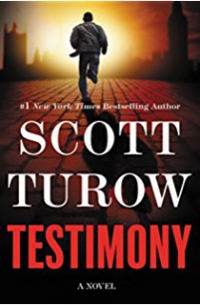
Published by Grand Central Publishing on May 16, 2017
Testimony is the first legal thriller I’ve read that focuses on the International Criminal Court. It is primarily fiction that is only based on fact at the edges of the story, including the ill-considered diversion of arms from Bosnia to Iraq that probably ended up in the hands of terrorists. The guts of the story, however, are pure fiction, written to Scott Turow’s usual standard of detail and deception.
Bill “Boom” Ten Boom has resigned from his Kindle County law firm and left his family behind to prosecute war crimes. In 2004, a group of soldiers allegedly wiped out a village inhabited by 400 Roma in Bosnia. The nearest soldiers happened to be Americans, and the massacre is rumored to have been an act of retaliation for the deaths of American soldiers in a failed attempt to capture a Serbian leader named Kajevic, a war criminal on the order of Slobodan Milošević.
In 2015, a friend of Boom who works for one of America’s spy agencies invites Boom to prosecute the case, which (in the spy’s view) means proving that the killers were not Americans. The thought is that having an American lead the investigation will prevent “some yahoo in Congress” from triggering an international crisis because the ICC is investigating a crime in which American soldiers are the suspected culprits.
Who killed the Roma? A furtive group working for Kajevic? American soldiers? Or, as some insist, did the massacre never happen? Boom’s investigation takes him from the Hague to Washington to Bosnia, placing him in danger while challenging the reader to figure out who is threatening Boom and what really happened to the Roma. Of course, as is common in Scott Turow’s work, the answer requires the careful dismantling of a cover-up.
Boom becomes involved in relationships with a couple of women during the course of the novel. The relationship drama is integral to the story while never threatening to overwhelm the legal drama. While he’s in Holland, Boom also learns something dramatic about his roots, another layer that interweaves with but doesn’t overwhelm the central story.
There are political overtones to the story, but they transcend party politics to ask fundamental questions about the nature of political and military leadership. The novel touches on the colossal political blunder that America made in invading Iraq, and the series of military and political blunders that followed. It also illustrates the debate between those who believe that America should not be subject to international law (among other reasons, because they perceive American soldiers as a likely target of persecution) and those who believe that America should avoid the double standard of judging other countries while being unwilling to be judged by them. The rule of law, after all, should apply equally to everyone, including Americans.
Those issues aside, this is fundamentally a legal thriller rather than a political story. Turow follows Boom and the other characters as they interview, investigate, excavate, and examine the evidence to see where it leads. The book is a model of how all criminal investigations should proceed, as investigators strive to find the truth, not to prove that their pet theory is accurate.
Turow’s characters, as always, have depth and substance. The story moves quickly without glossing over the fact that complex criminal investigations are painstaking affairs. The original plot and the strong characters make this one of the better novels that Turow has written in recent years.
RECOMMENDED